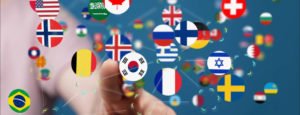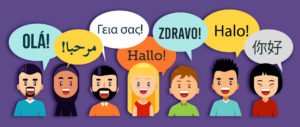
What is the Impact of Translation on Global Communication: Discussing how translation has helped bridge linguistic and cultural divides.
Translation is a crucial tool in global communication, allowing people from different linguistic and cultural backgrounds to communicate and understand each other. Translation helps bridge the gaps created by language barriers, enabling people to share ideas, knowledge, and perspectives across borders. In this article, we will discuss the impact of translation on global communication and how it has helped to bridge linguistic and cultural divides.

The Importance of Translation in Global Communication
As the world becomes increasingly connected, the importance of translation in global communication cannot be overstated. Translation enables people to communicate and understand each other, regardless of language or cultural differences. It allows businesses to expand their operations into new markets, governments to negotiate international agreements, and individuals to travel and connect with people from around the world.
Translation has played a significant role in the advancement of science, technology, and medicine. Researchers and scientists from different countries are able to share their findings and collaborate on important projects, thanks to accurate translations. In the medical field, translation is vital for sharing medical knowledge, research, and best practices across borders.

The Role of Translation in Bridging Linguistic and Cultural Divides
Translation has been instrumental in bridging linguistic and cultural divides, fostering understanding and cooperation between people from different backgrounds. It helps to break down stereotypes and prejudices by providing accurate and nuanced translations of cultural practices, beliefs, and traditions.
Translation has played a critical role in preserving linguistic and cultural diversity. Many languages and cultures around the world are at risk of disappearing due to globalization and cultural homogenization. Translation helps to preserve these unique languages and cultures by making them accessible to people who may not otherwise have access to them.
The Challenges of Translation in Global Communication
Translation is not without its challenges, however. Translating from one language to another requires a deep understanding of both languages and cultures. It is not simply a matter of substituting one word for another; it requires careful consideration of grammar, syntax, tone, and style.
Idiomatic expressions, slang, and other colloquialisms specific to a particular language or culture can also be challenging to translate accurately. These phrases can be difficult to translate accurately, and a mistranslation can completely change the meaning of a sentence or passage.
The use of technology in translation, such as machine translation (MT) software and computer-assisted translation (CAT) tools, has made the process of translation faster and more efficient. However, these tools are not perfect and can produce inaccurate translations if not used correctly. MT software is particularly prone to errors when dealing with idiomatic expressions and other complex language structures. As a result, human translators remain an essential part of the translation process.

The Future of Translation in Global Communication
As the world becomes more connected, the demand for high-quality translation services will continue to grow. The need for skilled and knowledgeable translators who can navigate linguistic and cultural differences will only increase. However, the development of new technologies, such as artificial intelligence and machine learning, will also play a role in the future of translation.
The use of AI-powered translation tools has the potential to revolutionize the field of translation, allowing for faster and more accurate translations. However, these tools are still in their early stages of development and are not yet able to match the accuracy and nuance of human translators.

Conclusion
Translation has played a critical role in global communication, enabling people from different linguistic and cultural backgrounds to communicate and understand each other. It has helped to bridge the gaps created by language barriers, fostering understanding, cooperation, and respect between people from different backgrounds. However, the challenges of translation must not be overlooked, and the need for skilled and knowledgeable translators remains essential. As the world becomes more connected, the importance of translation in global communication will only continue to grow.
Speakthylanguage is a language service provider working for more than 2 decades & offers professional translation services in 80 languages. Whether you need to translate a document, website, or video, Speakthylanguage has the expertise and resources to help you communicate effectively with your global audience.
In addition to translation services, Speakthylanguage also specializes in creating and managing multilingual websites. By translating your website content into multiple languages, you can reach customers from all over the world and provide them with a seamless online experience.
At Speakthylanguage, we are committed to delivering high-quality translations that are accurate, culturally appropriate, and tailored to your specific needs. Contact us today to learn more about our services and how we can assist you with your language needs.
Email us at: info@speakthylanguage.com




